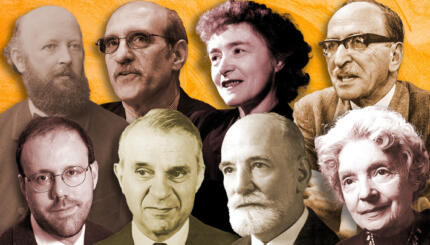Louis Dembitz Brandeis was born in 1856 in Louisville, Kentucky to a family of Jewish immigrants from Prague. Brandeis went to high school in Louisville, and graduated at age 14.
His family returned to Europe for a few years, and he joined them, traveling, and eventually attending university at the Realgymnasium Annenschule in Dresden. Following college, Brandeis came back to the United States and enrolled at Harvard Law School, where he graduated at the top of his class in 1877.
READ: Ruth Bader Ginsburg: Louis Brandeis Inspired My Work for Women’s Rights
After a short stint as a lawyer in St. Louis, Brandeis returned to Massachusetts and founded a law firm with a classmate from Harvard, Samuel D. Warren. The firm was successful, and Brandeis began to take an active role in progressive causes such as public regulation of utilities, savings banks and life insurance, along with anti-monopoly legislation.
With your help, My Jewish Learning can provide endless opportunities for learning, connection and discovery.
The Brandeis Brief
In 1908 Brandeis argued a case in front of the Supreme Court (Muller v. Oregon) in which he presented what came to be known as the Brandeis Brief. The Brandeis Brief was revolutionary because it did not rely on pure legal theory, but also on analysis of sociological information that examined the impact of long working hours on women.
The Brandeis Brief became the model for future Supreme Court presentations in cases affecting the health and welfare of individuals.
Zionist Activism
Brandeis’ desire to help Eastern European Jewry find a safe haven in Palestine was spurred by his contact in 1910 with Russian immigrant garment workers, whom he met while mediating a strike. He saw in these Jews a democratic spirit and idealism he had not expected.
READ: Jewish Immigrants in the Garment Industry
Two years later Brandeis became actively involved in Zionist causes through his friendship with Jacob de Haas, editor of a Boston Jewish weekly and a follower of Theodor Herzl. In 1913, Brandeis agreed to chair a Zionist meeting in Boston, and a year later he was unanimously elected to be the head of the Provisional Executive Committee for Zionist Affairs. From 1914-1918 Brandeis was effectively the head of American Zionism.
Brandeis was an adviser to President Woodrow Wilson on policy, and influenced Wilsons’s New Freedom economic doctrine. He published two books in 1914, Other People’s Money and Business–A Profession, in which he argued in favor of trade union rights and against big business. Brandeis was particularly concerned with the way companies treated their workers, and insisted that workers be privy to fair work hours, fair wages, and sanitary conditions.
Supreme Court Justice
In 1916 President Wilson appointed Brandeis to the Supreme Court, where he was confirmed despite a lengthy (125 days long) Senate confirmation process marked by anti-Semitic rhetoric as well as significant opposition from big-business lobbyists. He was the first nominee whose confirmation involved public hearings. He sat on the bench for 23 years, until his retirement in 1939. While on the court his votes and opinions envisioned the greater protections for individual rights and greater flexibility for government in economic regulation.
Louis D. Brandeis died on Oct. 5, 1941, and his cremated remains are interred under the portico of the Louis Brandeis Law School at the University of Louisville.
In 1948, Brandeis University, the Jewish-founded university in Waltham, Massachusetts that bears his name, opened.



